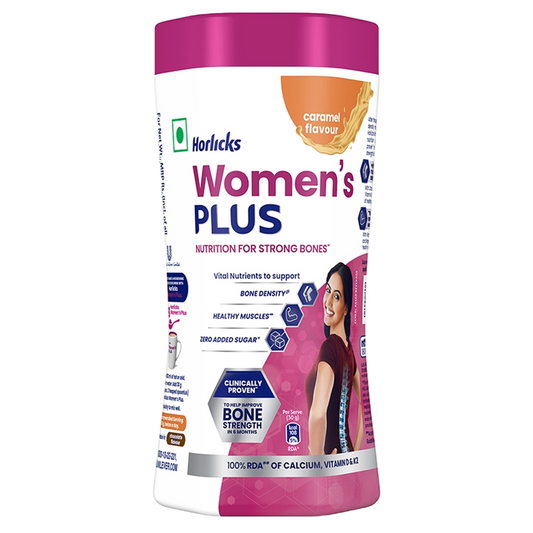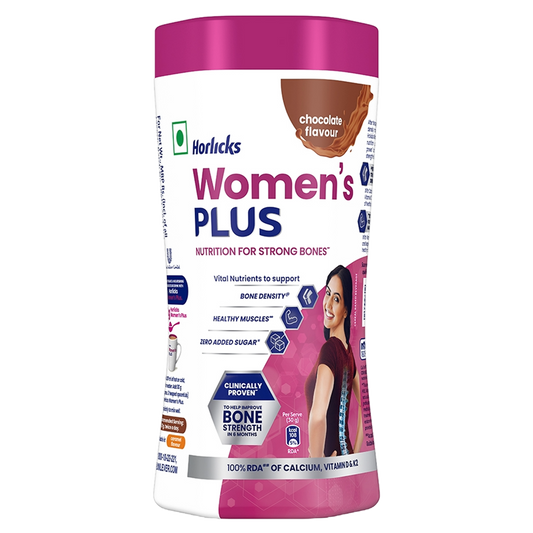Bones do more than just protect and preserve the body's shape; they go above and beyond.
The skull protects the brain, the spinal column (or backbone) protects the spinal cord that binds the brain to all of the other parts of the body, the rib cage holds your heart and lungs, and the pelvis protects the bladder, intestines, and uterus1.
Not only that, but bones also store calcium and other vital minerals, which are released into the bloodstream as needed by the body's other organs. Collagen and calcium phosphate, which make up the bones can support your body weight and your movements.
When it comes to bone health problems, gender matters, and women are more likely than men to develop osteoporosis.2 It's only natural that you look after your bones in every way you can.

Maintaining Bone Health
Bone health is often influenced by one's age. Women over the age of 30 and those going through menopause are more likely to lose bone mass at a faster rate.3 The mother supports the baby's calcium needs during pregnancy and breastfeeding. Any bone mass lost during this period is re-established within a few months.
One of the most important aspects of preserving healthy bone health is physical activity. Weight-training exercises aid bone development, and other high-impact exercises such as athletics, biking, jogging, brisk walking, aerobics, etc. go a long way to ensure bone health and maintain bone mass.4 Yoga is also known to improve bone density when practiced regularly.
Important Nutrients For Women’s Bone Health
It's just as essential to eat a balanced diet comprising foods high in bone-building nutrients as it is to remain physically active. Calcium, Vitamin D, and magnesium are the most important nutrients for bone health. Phosphorus, potassium, and Vitamin A are other important nutrients for bone health.
Nutrients Important For Bone Health & Their Sources
Let's take a look at the food sources that are rich in bone nourishing nutrients:
1. Calcium5
When your body does not get the requisite calcium from your food, it is acquired from the bones' calcium repository, leading to rapid bone mass loss. Milk and other dairy products such as plain yogurt, cheese, paneer, etc., are excellent sources of calcium. Additionally, soy milk, almonds, tofu, chia seeds, sesame seeds, mushrooms, and dark green vegetables such as spinach, kale, ladyfingers, and broccoli are packed with calcium as well.
2. Vitamin D6
Vitamin D is essential for the absorption of calcium by the body and can be readily found in foods such as egg yolks, mushrooms, and oatmeal, fatty fish such as herring, mackerel, tuna, and salmon. An adequate amount of sun exposure also promotes the synthesis of Vitamin D in the body.
3. Magnesium7
It regulates the level of Vitamin D and calcium in the body and can be found in green leafy vegetables, whole grains, legumes, various nuts and seeds, and avocados.
4. Phosphorus And Potassium8,9
Phosphorus and potassium are key bone minerals and help neutralize the effect of acidic foods and the acids released during your body's metabolic activities. Protein-rich foods such as soy, fish, meat, eggs, legumes, and whole grains are excellent sources of phosphorus and potassium can be found in fruits such as bananas, apples, and oranges; dried fruits such as raisins, prunes, and dates; and vegetables such as spinach, broccoli, potatoes, sweet potatoes, pumpkins, zucchini, cucumbers, and peas.
5. Vitamin A10
It is responsible for the regulation of bone-building and bone-breakdown cells. Lamb liver, cod liver, sweet potatoes, spinach, carrots, mangoes, and eggs are packed with Vitamin A.
6. Zinc11
Responsible for mineralizing bones, zinc also aids the synthesis of Vitamin D and proteins. Sources of zinc are shellfish such as shrimp, crab, lobsters, clams, mussels, oysters and scallops, whole grains, and yogurt.
7. Vitamin B1212
It is also believed to influence bone-building cells. Some common sources of Vitamin B12 are meat, fish, cereals, dairy products, poultry, and eggs.

8. Vitamin C13
Vitamin C promotes collagen production and is known to aid the absorption of iron. Citrus fruits such as oranges, sweet lime, kiwi, amla (Indian gooseberry), broccoli, sprouts, mixed berries, papaya, and cauliflower are amazing sources of Vitamin C.
Additionally, you can also add Horlicks Women's Plus to your daily diet. It's a nourishing beverage made specifically for women. Its advanced #CALSEAL formula contains 100 percent of the daily requirement of calcium, Vitamin D, and Vitamin K2, the three key nutrients linked to bone health. It is low in fat and features a ‘no added sugar^’ composition, which makes it a good choice for health-conscious women. Horlicks Women’s Plus is available in delicious caramel and chocolate variants. this is k1 not k2









